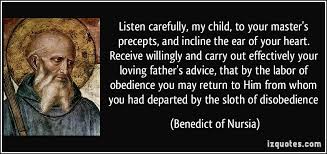
“Be still, then, and know that I am God…” (Psalm 46:11. The Book of Common Prayer, p.650).
These simple words tell us to be still and know who is God. Yet, the very moment we hear them we are made aware of how disturbed we are. The words and the punctuation are meant to give us some important spiritual direction. Be still followed by a coma, the word then followed by another coma and the knowing who is God seem to suggest a brief moment of rest with the next word being followed by another moment of repose that leads us to knowing who is God.
When I first read these words, my whole being discovers that I am anything, but, still. I have various personal issues that make being still very challenging. It is not easily achieved by my own strength. It takes me being “attentive with the ears of the heart” to remember that becoming still is something I need God’s help to do. God speaks through these words, to tell me how much God loves me and that God knows me better than I know myself. God helps me remember that it is God’s Grace that will lead me to a stillness, by helping me to let go of thinking that I must be still on my own strength.
Our God wants nothing more from us than to search for union with God with purity of heart. To be in union with God means wanting God only because of who God is and not what God can give. God knows that we cannot do this without spending some time in silence, stillness and solitude so that God can take us on a journey through our whole selves, to bring us healing and holiness through an intimate relationship with God.
In contemplation, we long for the stillness that comes from just being with God wherever we are. Through mysticism we let go of what we think we know and trust in God’s love to take care of the rest.
“Speaking and teaching are the master’s task; the disciple is to be silent and listen.” (RB 1980: The Rule of St. Benedict, Chapter 6. p.31).
Can you find a place and moment to be still, then, you will know who is God?
Amen.
Peace be with all who enter here.
Brother Anselm Philip King-Lowe, OSB
See: Br. Anselm Philip’s Ministry of Spiritual and Grief Companionship
If you feel led to buy me some coffee to help support this blog ministry, please scroll down to the bottom of the right sidebar and click on the Benedictine Coffee Mug. Thank you very much.


